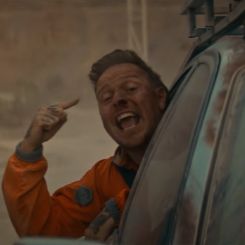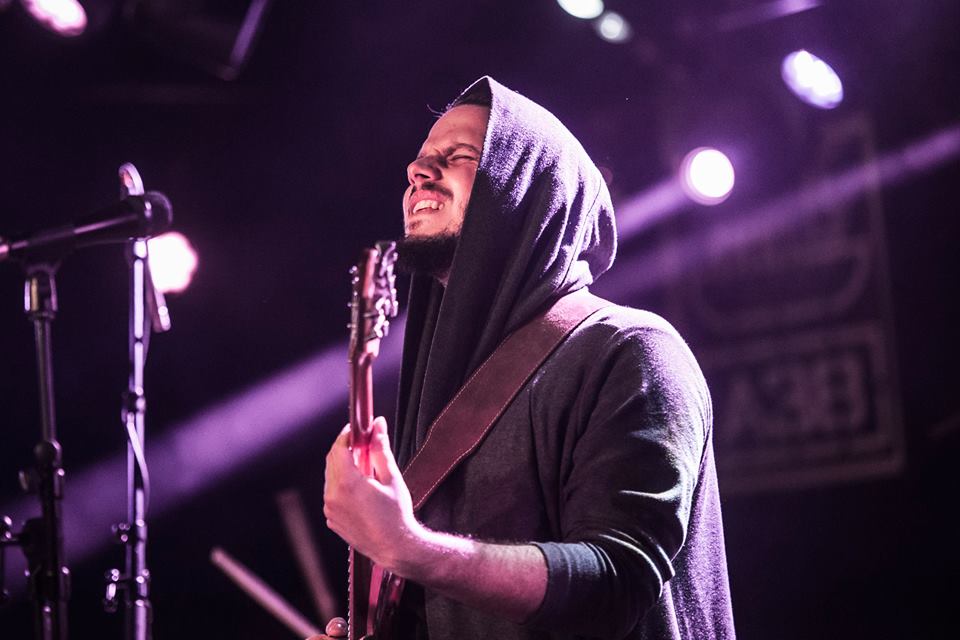
2017. április 23.

Serbian guitarist-composer David Maxim Micic became a huge favorite of many prog fans over the world throughout this decade, thanks to the excellence of his homemade solo records and his project Destiny Potato. After years of constant online presence and some one-off live shows here and there, this spring saw the Berklee graduate musician embark on his first proper solo tour. Having been a huge fan of his music for some years now, I had the pleasure of sitting down with the man himself for a friendly chat last month on the A38 boat before his first show in Budapest, on tour with Plini and Disperse, in support of his new album Who Bit The Moon. We spoke about his career, guitars and gear, the difficulties of being a musician from Eastern Europe, and also how to write instrumental music with substance.
So how’s the tour been going?
It’s been going great! The crew is amazing, all the shows have been packed. If not sold out, then packed, but most have been sold out. Plini’s smashing it pretty much. It’s been amazing, a great experience.
This has been a long time in the making, and a lot of people online, especially on forums and stuff have been saying for years that you and Plini should get together on a tour. Was this inevitable?
Yeah, we discussed the possibility of this tour for the first time maybe 3 years ago. We were like, “let’s do it, 2016!”, hoping we were going to grow enough until then. We’re one year late, but still, it’s happening. So yeah, we had plans.
Did you feel that you had to get to a certain point in your career, with your releases, before you could embark on this?
Yeah, definitely, because a European tour is a huge thing to swallow. If you’re not prepared for it, it’s a huge bite… financially, it doesn’t make sense to do it.
Is that partially the reason why you mix the bands together when you go on tour, like how Plini did with Intervals?
Logistically mostly, it really makes sense. But it’s also just more fun that way. It’s just a few people that you really know well, and you have fun, and this makes it much easier.
If you put together a tour with yourself and Plini, both being these “one man bands”, does that ever push the other musicians to the background?
I don’t think so. We try not to make musicians who play with us play the exact way that it is on the album. So they’re having a lot of fun, and I think the audience can hear that in our live sessions. It also gives them exposure as well, which is fair I think.
How do you contrast your playing style with Plini’s? Where do you see differences between what you do and what he does?
I don’t know, it’s best for the audience to decide, I guess. I think we’re pretty different, but we also inspire each other in a really positive, natural way, and that works. The genre is kind of similar I guess, because it’s guitar-based music, although some of my previous records weren’t so guitar-centric. With my newer stuff I just wanted to kind of get that guitar game going on, so I can play more live, and it’s happening.
As being the head and namesake of your band, do you ever feel that dealing with all the management, the press, the organization, ever becomes too much? Does it ever get overwhelming?
It’s interesting because I just discussed this with Jakub [Zyteki] a few days ago, it kind of comes as normal. If this happened five years ago, it would probably be a bit too much. But since you work so hard, you release many records, it just kind of comes naturally, and you accept it and you try to see what you can do next, and where you can push.
Do you ever feel like the demand pushed on you by fans is too much? You put up a funny video recently about a guy who was asking you about what studio monitors he should buy, and you answered him, to which he gave a pretty rude response. Is this ever just too much?
It depends on the day I guess. Sometimes I’m really into just answering fan mail and messages, no matter what they write, or whether it’s a stupid question, or whether they have obvious answers which you can find on Google or my page. I just find it fun sometimes. It’s part of the job I guess. In today’s age, it’s normal to stay in touch with your fans as much as you can. Some people will get a response, some people will get mad, some people will understand. It’s all part of the game, I guess.
In this particular instance it was kind of interesting to notice how so many people rely on a “magic formula” of brands and equipment, that they kind of expect a straightforward answer and you telling them to buy these monitors, that guitar, those cables, and they’ll have the same result you did. Do you think people rely too much on gear?
Absolutely, which is one of the reasons why I made the Stock Challenge last year, where I did songs out of my comfort zone with only Cubase Elements and only stock plugins, my guitar and my cable, and that’s pretty much it, and just a pair of regular headphones. Those songs didn’t sound like me, it wasn’t really David Maxim Micic or Destiny Potato kind of stuff, but it’s interesting how limiting yourself can inspire you in different ways. So equipment is not important. It becomes important at one point, like if you want to do a proper show, you need to have a proper sound, proper gear to make it happen. But today’s consumerism age is taking over. Some young people are suffering from it, thinking they should have the Axe-FX, or they should have the Kemper, or this guitar or that guitar. It really doesn’t matter. Jakub recorded his albums on Amplitube, the last two records. It sounds amazing. He used some really unknown samples for drums, and stuff like that. Whatever you have, just try and create with it.
Do you think this can (at least partially) be because of your heritage? Being from Eastern Europe, given the wage gaps between East and West, I think young kids can’t really afford the stuff they see bands using, while in Western countries (and I’m not saying they all can, but) it’s easier to invest at a younger age, in really high quality studio equipment.
I was fortunate enough to grow up in a family that wasn’t really poor; we’re not rich in any sense, but we had enough money. My dad bought me my first guitar for three hundred euros. Also I used to work on a lot of pirated software, like torrented software and stuff like that, for years. I started working on my music when I was twelve, and as soon as I decided to make my first record, which was Bilo 1.0, I decided to buy Cubase and go completely legal, because I was like “if I’m going to make any money ever, I don’t want to steal anyone’s bread”, I guess. So I don’t know if that really made that much of a difference in my case. But still, a lot of technical stuff like guitars and amps and customer service are easier to reach outside of Serbia, especially with taxes and all that kind of stuff, it can be a bit overwhelming. Either way, it’s not the factor that decides if you’re going to be a good musician or a bad musician.
 Musically you seem like a very emotionally open person, you seem to very effectively channel a lot of emotion into your music. Is this due to your upbringing, to the family environment you grew up in?
Musically you seem like a very emotionally open person, you seem to very effectively channel a lot of emotion into your music. Is this due to your upbringing, to the family environment you grew up in?
Might be. I grew up in a family where we were always pretty open, a pretty emotional family overall, and they’re actually here tonight, which is pretty cool. The easiest thing to drive me to make more music is basically just the everyday stuff that’s happening in my life. It could be a really big, really deep thought, like ‘Wrinkle Maze’ for example which was written for my parents. It’s inspired by watching them getting old, I guess. Or ‘When She Crafts’ from the latest record, where the story is basically that my girlfriend came to my place for five days because she was moving from her village to the city. In that transition period she stayed at my place, and she was working on some paper crafts. She worked in my room, where I usually work, and it was a complete mess; papers everywhere, cables everywhere, me trying to write some new music (not succeeding at all), being distracted and all that. So I decided to just put the microphone in front of her while she was cutting paper, and just played whatever comes first on a guitar, and that was the song. I didn’t write anything smart to it, that’s the song.
That’s really, really cool! I actually wanted to ask you about that song in particular, because one thing I’m very curious about, is how difficult is it for you to convey these stories in an instrumental setting? I mean previous records did have more vocals, with written lyrics and everything, but none on Who Bit The Moon. How do you manage to convey stories and emotion through instrumental music?
I just tend to make it work for me, I guess. If I can tell the story to myself and feel the emotion that I felt at the moment the song was written for, I’m fine with it. As long as I’m happy, it’s cool. I try not to push too many stories out behind the songs, because almost every song of mine has a really important story behind it, because I really want people to make their own stories with my music. I think it ruins the experience of listening, if you listen and you know “oh okay, that’s Dave’s girlfriend cutting paper”. Someone will find something entirely different in that song. Most of the time I don’t like pushing stories onto people. If it works for me, it works for me, and I hope it will work for everybody else.
A lot of the song titles on Who Bit The Moon suggest very particular stories. For example, ‘Someone Else’s Hat’ sounded very specific, or ‘687 Days’…
With titles I guess I just want to give some hints as to what the story might be, but still I don’t want to push it in [the listeners’] faces.
Are there any songs on Who Bit The Moon which are closer to you emotionally? To me, ‘Damar’ and ‘687 Days’ sounded particularly personal.
‘687 Days’ is just a feel good song, I guess. I felt awesome at the time, and I was like, “I’m gonna write a really cool song!” The title behind it is pretty simple, anyone who can Google “687 Days” will find out that that’s how long the year is on Mars. When I wrote the song it was much more “cyber” sounding I guess, and when I decided to put it on the record, I thought “this is sounding too electric”, so I worked with it a bit more. But the working title just stayed there, and I thought “it’s a cool title, I’ll just keep it there”. That is, for example, one of the songs where there isn’t really a big underlying message, it’s just a fun song I guess. Then ‘Damar’, it kind of tells a story about the region where I grew up. It has a lot of those Balkan elements in it, inspired by a lot of folks songs I’ve been listening to through my entire life, and just wanted to bring them a bit closer to the listeners.
If we’re talking about the titles, what about the album title, “Who Bit The Moon”? Is that a question? Since there’s no question mark at the end of it…
There’s no question mark! It’s a question, but I left it without the question mark.
Would that song on the album have any stronger attachment to you, being the album title as well?
Absolutely. That one is probably the most emotional, with a lot of stories in it. When you have a complex story like that, it kind of ends up with a question, and the question was “who bit the moon?” It’s like a metaphor for something else, but it’s still there I guess.
 How does, if in any way, Who Bit The Moon tie back to EGO and ECO?
How does, if in any way, Who Bit The Moon tie back to EGO and ECO?
EGO and ECO were an experiment. EGO in particular I really struggled with, because I wanted to write music for the sake of being complex or heavy, or whatever it is. So I hated working on that record, it was just a struggle overall. Then ECO just came as a vacation pretty much, I didn’t even feel like I was working at the time, like I could write ten more albums like that in the next half year. It just felt awesome. With Who Bit The Moon I wanted to kind of keep that feeling, but make it instrumental. Many people picked up on that, whether it is in any way connected, and it is… in a way.
Will it be continued through a next release, or is nothing planned yet?
Well, the next release will probably be Bilo 4. So I don’t know, I’ll know as soon as I start working on it, haha.
One thing which was different for me on Bilo, EGO/ECO and Who Bit The Moon, was that a lot of your songs have a lot of melodies and themes which slide between tracks, and sometimes even albums, but not so much on Who Bit The Moon. Will you be continuing this on Bilo 4?
Bilo 4 will be the continuation of the Bilo saga, so there will definitely be some “quotations” happening. But Who Bit The Moon was meant to feel like a completely different and new release, which is why I didn’t have many quotes from the previous records.
The piano and orchestral intros in Bilo 3.0 and ECO absolutely give me shivers every single time, I think that’s incredible stuff that you do which can in no way be simply labeled “progressive metal” or “djent” or what have you. Have you considered working on movie scores, soundtracks, a symphony or something larger which isn’t “simply” progressive metal?
Writing orchestrations has been my passion since I started writing music when I was twelve or thirteen. All my older stuff is just violins, guitars and drums. It’s been a huge passion of mine since forever, and I was lucky enough to do a couple of movie scores. I did some student movies for practice, then after Berklee [College of Music] I had a gig where I did 50% of the soundtrack for a movie called Assassin’s Bullet. The movie didn’t do too well, but the crew was amazing, and just the experience was amazing. They had actors like Donald Sutherland and Christian Slater on it, which was a bit of a surprise for me to have a first gig like that. But soon after that, I really decided to focus on my own music, and that’s when I released Bilo 1, and then the rest of the records. Recently I did a bit of the soundtrack for a video game called Hellion, and I’ll probably start doing a full soundtrack for one of their next games, next year probably. So I’m slowly grasping to that side of the music business, or that genre, and I’m loving it. It’s challenging, it’s a lot different than what I’m used to now, just writing record after record. It’s exciting.
Could you give a very brief overview of the equipment that you used on Who Bit The Moon? I saw a video not long ago that you did at the Kiesel booth at NAMM…
It was the Dunlop booth! I got a proposal from the Dunlop guys to do a presentation on such a short notice, I was like “okay, can you guys just lend me a guitar then?”, since they’re in touch with so many companies. Then the Kiesel guys were such gents to just lend me one of their Vader guitars – amazing guitars. We talked briefly about maybe getting me working with them, but since then I’ve gotten proposals from so many guitar companies, I’m waiting for the right one to appear.
Is there any particular company drawing your curiosity?
Some interesting things are happening… for example Cort guitars are interesting. With Cort guitars you have mixed feelings, because they’re known for very cheap guitars. But the stuff they’re doing which is their high-end line is amazing. They’re trying to get into that market a bit more in the next few years. I’ve been in touch with them and they do some amazing stuff. They’re probably one of the biggest factories, if not the biggest factory in the world at the moment. Then the Aristides guys, I know them personally really well. We’ve been discussing working together for two years now, nothing happened… all those things go kind of slow. They have their stuff, I have my stuff, and all those companies… it takes time. A few smaller companies as well, although I really love the guitar that I’m playing now, which is Wood Guerilla, a really, really small guitar manufacturer. It’s not even really a manufacturer, it’s just one guy making some amazing instruments in Belgrade.
Is that what you used for [Who Bit The Moon]?
Yes! And that’s the guitar I’m using live currently. The guitar he made was supposed to be a prototype for my future signature model for Wood Guerilla, but it sounded so good when I tried it that I decided not to go with another model, that I’m just going to keep the prototype. It has a lot of mistakes in the build, you know, and I really don’t care. As long as it plays fine and sounds great, I’m cool.
Which drum machine did you use for the album?
Maybe a month before I started writing the record, Misha from Periphery sent me a copy of Getgood Drums, and he was like “man, try it out, let me know what you think, post some samples of it when you have the time!”
…so you just made an entire album with it?
Sure, haha! It’s Getgood Drums all the way. Here and there I used some samples for toms, for example, because the toms in the current library are not really my taste, so for some songs and some particular parts I used the toms from the Superior Drummer [library]. But everything else works amazingly well, so I can’t recommend it more.
Was the bass live this time, or programmed like on previous releases?
It’s still played on the keyboard. I’m really comfortable by now just playing bass like this.
 What about the equipment that you use for the tour?
What about the equipment that you use for the tour?
I have an Axe-FX, Plini and I are sharing the poweramp which goes to the Orange 2×10 cabinet which is not mic’d at all, so we have direct sound coming to the PA and the cabinets are only for the stage gap, so people in the front rows don’t miss out. We try to keep it band-level, and it works fine.
Sounds like a simple setup!
It’s a really simple setup, yeah. And my sound is just the Who Bit The Moon sound, I did a tone match from the record with all the EQ-ing that was on the record. Then just a bit of scooping on the high end and low end. I like how it sounds so far.
What happens when the tour is done? What are your plans for the near future?
As soon as I’m done with the tour I’ll probably get a small vacation, probably go to Italy with my girlfriend for a couple of days, then get back home and play a lot of Sony Playstation, because I haven’t done that in months. Then Destiny Potato stuff. We have some really, really cool plans. We have a really cool budget, so there’s a lot to be done there. My main focus will be Destiny Potato for the rest of the year I think. Then Bilo 4, probably next year.
Are you considering maybe doing the same trek in North America or Asia with Plini or any other bands?
We discussed some stuff briefly, but there is nothing concrete yet. But it might happen at some point.
As a former student of Berklee, what is the single most important piece of advice that you would give young or aspiring musicians on music composition, and how to focus their musical energies?
From the perspective of “David 2009 Berklee Student”, or this today?
Both!
If there’s one thing that Berklee taught me, it’s hard work. Boston by itself is the biggest university city in the world I think, with MIT, BU, Berklee, Harvard University, all those. It feels like 99% of people on the streets are students just like you, just working their ass off. I didn’t have such a strong working habit until then. Of course I did a lot of music, but just the working habit, focusing on work. So working hard, I guess, from that perspective.
From the perspective that I am now, where I finally have some following and people who appreciate what I do… I like to say this on my master classes, to kind of encourage people: there’s seven and a half billion people on this planet, and out of seven and a half billion there’s like three and a half billion people with internet today. In the next few years it will be two billion more. Out of those three and a half, four billion people, whatever you’re doing, if you have quality to offer, I think there will be enough people that appreciate what you’re doing and be ready to pay for it, and you can make a living out of it, as long as you work hard and offer quality.
Photos: Lajos Somogyi / Bands Through the Lens